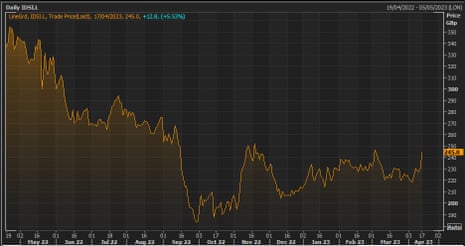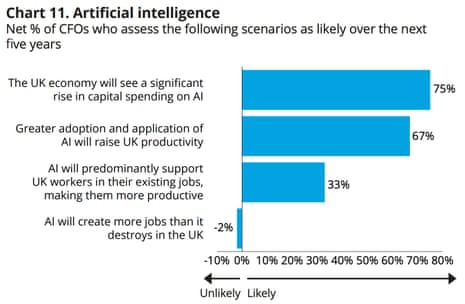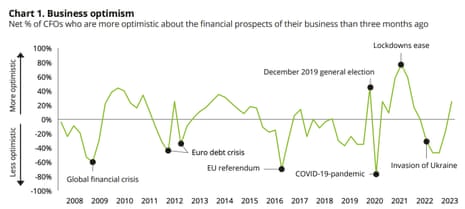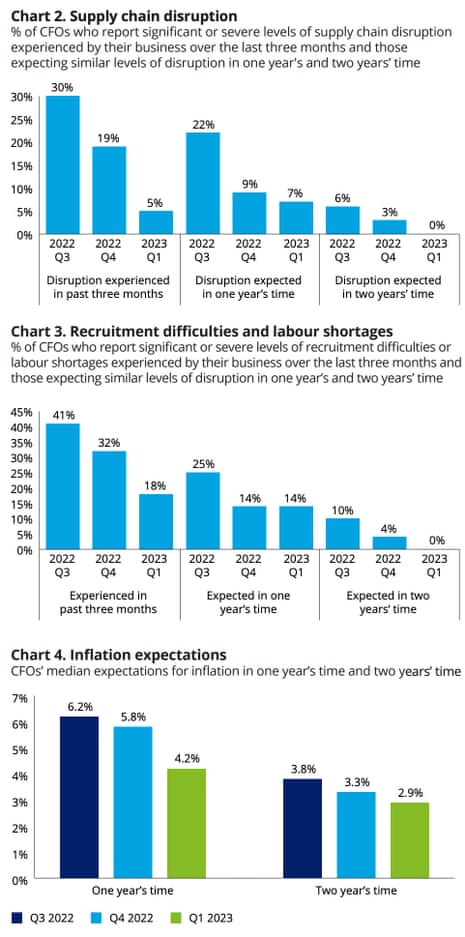FTSE 100 on track for best run since December 2020
Rising economic optimism is helping to lift shares in London this morning.
The FTSE 100 index of blue-chip shares is on track for its best run in over two years.
I’t’s up 33 points, or 0.4%, at 7095 points, the highest in over five weeks. as shares recovered from the turmoil in the banking sector last month.
This would be the FTSE 100’s seventh daily rise in a row, its best run since December 2020.
Industrial and electronics products distributor RS Group are the top riser, up 2.4%, after RBC raised its rating on the stock, followed by airline group IAG (+1.8%) and packaging firm DS Smith (+1.8%).
The news that UK CFOs are more optimistic about economic prospects has brought some cheer to the City.
The takeover approaches for Network International and John Wood (both members of the smaller FTSE 250 index) could also spur stocks higher, after decent financial results from JP Morgan last Friday.
“The FTSE 100 made brisk progress on Monday as a solid start to the US reporting season and a sprinkling of M&A activity helped buoy sentiment,” says AJ Bell investment director Russ Mould.
“Given all the drama around the sector in recent weeks it felt important that the big American banks which reported last Friday beat market expectations.
While corporate announcements from the US are likely to continue to grab the headlines, a lot of the spotlight in macroeconomic terms is likely to be drawn by China with a raft of data set to be published imminently. For a FTSE 100 index teeming with resources stocks, this could have a big bearing given China is such a rapacious consumer of commodities.
Investors will be watching closely for signs of a recovery from a Chinese economy emerging from strict zero-Covid restrictions.
Key events
European stock markets are also moving higher this morning, with Germany’s DAX up 0.16% and Italy’s FTSE MIB gaining 0.25%.
Pierre Veyret, technical analyst at ActivTrades, explains:
European shares openened on a positive note, following the lead of Asian benchmarks, as risk appetite remains strong at the beginning of this new week.
The bullish sentiment continues and investors may be willing to push stock indexes to new highs, despite lingering concerns over higher borrowing rates and economic recession. This sustained appetite for riskier assets may come from the fact some investors see the current monetary tightening cycle to be closer to the end than the beginning, while expecting a shallower recession than initially anticipated.
Additionally, last Friday’s strong Q1 earnings from US banks, amid industry turmoil, is also fueling optimism across equities. Most sectors in Europe are trading in the green in Europe, with the top movers being registered in industrials, basic materials and energy stocks.
Bloomberg: UK heads for pause on interest rates
Hopes that UK interest rate increases could soon be over are also cheering the City.
More than half of economists in a Bloomberg News survey now think the Bank of England will refrain from raising its key rate again.
BoE Bank Rate is currently 4.25%, and its monetary policy committee will decide in early May whether to raise it again.
Economists suspect that the pressure on the BoE will ease on Wednesday, if inflation dips below 10% for the first time since August.
“It’s pretty clear that labor market tightness is fading,” said Robert Wood, chief UK economist at Bank of America.
Wood adds:
“Certainly that’s good news for the Bank of England, and it does make the May decision a really close call.”
The money markets, though, are that indicating a rate rise in May is a 70% probability.
FTSE 100 on track for best run since December 2020
Rising economic optimism is helping to lift shares in London this morning.
The FTSE 100 index of blue-chip shares is on track for its best run in over two years.
I’t’s up 33 points, or 0.4%, at 7095 points, the highest in over five weeks. as shares recovered from the turmoil in the banking sector last month.
This would be the FTSE 100’s seventh daily rise in a row, its best run since December 2020.
Industrial and electronics products distributor RS Group are the top riser, up 2.4%, after RBC raised its rating on the stock, followed by airline group IAG (+1.8%) and packaging firm DS Smith (+1.8%).
The news that UK CFOs are more optimistic about economic prospects has brought some cheer to the City.
The takeover approaches for Network International and John Wood (both members of the smaller FTSE 250 index) could also spur stocks higher, after decent financial results from JP Morgan last Friday.
“The FTSE 100 made brisk progress on Monday as a solid start to the US reporting season and a sprinkling of M&A activity helped buoy sentiment,” says AJ Bell investment director Russ Mould.
“Given all the drama around the sector in recent weeks it felt important that the big American banks which reported last Friday beat market expectations.
While corporate announcements from the US are likely to continue to grab the headlines, a lot of the spotlight in macroeconomic terms is likely to be drawn by China with a raft of data set to be published imminently. For a FTSE 100 index teeming with resources stocks, this could have a big bearing given China is such a rapacious consumer of commodities.
Investors will be watching closely for signs of a recovery from a Chinese economy emerging from strict zero-Covid restrictions.
EY Item Club: UK now on course to avoid recession
UK now on course to avoid recession, according to the EY ITEM Club Spring Forecast.
The economic forecasters predict UK GDP will rise by 0.2% this year – adding to the optimistic mood this morning.
Although that’s only marginal growth, its better than the 0.7% contraction expected three months ago in its Winter forecast.
EY ITEM Club predicts that:
-
The UK economy is forecast to flatline in the short term and avoid two consecutive quarters of contraction – before better growth later in 2023
-
House prices are expected to fall by around 10% peak-to-trough, although a serious correction is unlikely and the impact on the economy will be limited
-
Historically high inflation should fall quickly in the coming months, with cheaper energy having a significant effect
The UK economy seems to be turning a corner, “albeit very slowly”, explains Hywel Ball, EY’s UK Chair:
Economic performance has been resilient, despite challenges in the latter half of 2022, but the significance of the upgraded outlook shouldn’t be overblown. While easing, the economy’s challenges haven’t gone away overnight: inflation is still in double-digits and energy prices remain historically high.
“However, perceptions matter and the fact the economy has been able to outperform expectations could help stir a revival in business and consumer confidence. Of course, there is still room for economic surprises, but the balance of risks has become a little more favourable than the last forecast. And while subdued growth this year is far from ideal, falling energy prices and inflation, an end to rises in borrowing costs, and growing confidence, mean the economy has a chance to shed some of the gloom it has accumulated recently.”
Sega offers to buy Angry Birds creator Rovio
Another takeover deal: Japanese gaming giant Sega Sammy has agreed to buy Angry Birds maker Rovio Entertainment.
The groups confirmed in a joint statement this morning that Sega, the firm behind franchises such as Sonic the Hedgehog, will buy its Finnish rival for €706m (£625m).
It comes after Rovio confirmed the companies were in discussions over a potential offer on Saturday.
Sega will pay 9.25 euros per share and 1.48 euros per share option for the mobile gaming business.
The Japanese firm has said it plans to “accelerate” growth in the global gaming market through the deal and create synergies between the two businesses.
Alexandre Pelletier-Normand, chief executive officer of Rovio, said:
“I grew up playing Sonic the Hedgehog, captivated by its state-of-the-art design.
“Later, when I played Angry Birds for the first time, I knew that gaming had evolved into a true mainstream phenomenon, with the power to shape modern culture.
Royal Mail shares surge after pay agreement reached
Shares in Royal Mail’s parent company have jumped over 5% after it reached an agreement in principle with union leaders over the long-running dispute over pay, jobs and conditions.
Royal Mail said last night it had reached a negotiators’ agreement with the Communication Workers Union (CWU), the details of which will be made public once it has been ratified by the union’s executive committee, which is expected to take place next week.
Workers had staged a series of strikes last year, affecting its 112,000-strong workforce, and leading to concerns Royal Mail could be put into administration.
The joint statement said:
“After almost a year of talks, Royal Mail and the Communication Workers Union are pleased to announce they have reached a negotiators’ agreement in principle.
Shares in Royal Mail have jumped to their highest level since early March this morning.

Takeover action in the City
There’s a flurry of takeover excitement in the City this morning too.
Network International, which is the largest payment processing firm across Middle East and Africa, has received a takeover proposal from a consortium of CVC Capital and Francisco Partners.
This value the London-listed company at about £2.06bn, or 389p per share.
Shares in Network International have jumped 20% to 364p per share, having also jumped on Friday when CVC’s interest was reported.
Eslewhere, oilfield services and engineering firm Wood Group says it has decided to engage with Apollo Management, over an approach worth £1.66bn, or 240p per share.
Apollo is now required to announce a firm intention to make an offer for Wood by May 17th.
Victoria Scholar, head of investment at interactive investor, tells us:
“Having previously rejected four offers from Apollo, John Wood Group said it is willing to engage with the private equity firm again. A fifth proposal has been submitted to the Board at a final price of 240p per share in cash, valuing the engineering services company at £1.66 billion.
The deadline for a firm offer from Apollo has been extended from 19th April until 17th May. Speculation of a takeover has supported Wood’s shares this year, which are up over 49% to Friday’s close.
The recent recovery in sterling, which hit a 10-month high over $1.25 last week, could also be spurring some potential buyers to make their bids for UK firms now. If the pound keeps rising, it would make it more expensive for foreign firms to buy British companies.
Scholar explains:
This deal adds to the flurry of private equity M&A activity in recent days alongside Dechra Pharmaceuticals, Network International and property company Industrials REIT. There is a sense among international investors that the UK is ripe with takeover targets.
The recent rebound for the pound suggests opportunistic buyers need to make the most of sterling’s weakness before it appreciates further and is too late.”
CFO’s expect boom in AI spending
Deloitte also investigated CFO views on artificial intelligence – and found that bosses expect “significant growth in capital spending on AI”.
That, they believe, will help drive UK productivity.
However, CFO’s were almost equally divided between those who believe that AI will lead to an increase in the number of jobs and those who believe it will shrink the human workforce.

Stewart explains:
“The CFOs foresee artificial intelligence helping to drive UK productivity, an outcome that could provide a lasting boost to business growth.
They are divided, however, on how AI will affect the number of jobs in the economy, highlighting the need to ensure the gains from new technologies are widely shared.”
Campaigners, trade unions and MPs agree. They’re calling for stricter oversight of the use of artificial intelligence in the workplace, amid growing concerns about its effect on staff rights.
Introduction: UK business confidence bounces after energy prices fall
Good morning, and welcome to our rolling coverage of business, the financial markets and the world economy.
The health of the UK economy appears to be picking up, with finance bosses at top companies more optimistic about growth prospects.
Deloitte’s quarterly poll of chief financial officers across UK boardrooms has found the sharpest rise in confidence since the rollout of COVID-19 vaccines at the end of 2020.
Having run markedly below average throughout last year business confidence has risen sharply, Deloitte says, and is now well above its long-term average.

Confidence has been lifted by the recent big fall in energy prices, as Britain also got through last winter without energy blackouts which had been feared.
Next-month natural gas prices are trading around 100p per therm today, having hit 640p per therm last August as Russia cut Europe’s gas supplies.
Brexit fears have been eased by the Windsor Framework, addressing some of the problems with UK-EU trading relations.
CFOs reported a marked easing of supply chain and recruitment problems, while firms are also expecting inflationary pressures to ease; expectations for inflation in one year’s time have declined from 5.8% to 4.2%.
Wednesday’s UK inflation data is expected to show a small fall in consumer price rises, to around 9.8% per year in March from 10.4% in the year to February.

But risk appetite is below normal levels, with CFOs heavily focussed on cost control and building up cash.
Ian Stewart, chief economist at Deloitte, says:
“The economic unpredictability that marked the beginning of 2023 has started to clear, with CFOs reporting the largest decline in perceptions of uncertainty to date. Business confidence has rebounded, helped by a decrease in energy prices, an easing of Brexit concerns and an improving inflation backdrop.
Crucially, finance leaders report little change in credit conditions, suggesting that March’s events in the global banking system have not affected the pricing and availability of credit for UK corporates.
Despite a brighter outlook, CFOs are alive to the continued risks facing the economy. Corporates remain in defensive mode and CFO risk appetite is subdued.”
Last Friday we learned that the UK economy has risen above its pre-pandemic levels, despite failing to grow in February.
The agenda
-
10am BST: China’s Foreign direct investment data
-
2pm BST: Bank of England deputy governor Sir John Cunliffe gives keynote speech at the Innovate Finance Global Summit
-
3pm BST: NAHB US housing market index
-
4pm BST: ECB president Christine Lagarde gives speech at the Council on Foreign Relations









